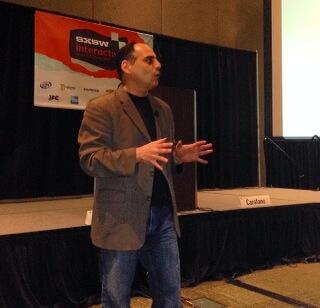Heritage’s Carafano at SXSW Tech Conference: ‘If You Care About Freedom, Care About Cybersecurity’
Ericka Andersen /
If you care about freedom and prosperity, you ought to care about cybersecurity. That’s what Heritage’s James Carafano told an audience at the South by Southwest Interactive (SXSW) conference in Austin, Texas, on Sunday.
Cybersecurity, a growing issue of concern around the world, was a hot topic at the nation’s most popular tech and innovation conference this year.
Carafano, vice president of foreign and defense policy studies and E.W. Richardson Fellow, said the No. 1 target for the Chinese is not the U.S. government or other major entities, but foreign students studying abroad.
Through LinkedIn, Twitter, Facebook, Reunion.com and more, cyber-soldiers home in on their victims—and most people just aren’t paying attention.
“I think it’s a fundamental responsibility for this generation to understand this space,” said Carafano, who wrote the book, “Wiki at War: Conflict in a Socially Networked World.” His life-long work on national security issues was the genesis of writing a book on the ever-important issues of cyberwarfare.
>>> Read More: Heritage’s Carafano Chosen for SXSW Conference
In a recent article on the same issue, Carafano pointed out the FBI uses social network analytics tools in it investigations, “but many of their tools are no better than, say, Klout—a tool available for free, to anyone online.”
In the talk, he compared traditional warfare to cyberwarfare, saying that in both situations, you “need a decisive military advantage if you want to win.”
That means taking the “high ground” and being able to sense the environment around you better than your competitor, according to Carafano.
Because the government doesn’t understand or work well in cyberwarfare, Carafano believes it must be fought in other ways.
“Government is linear and social networks are non-linear,” he said. “That’s why we need a generation of leaders who can operate comfortably in the linear and nonlinear worlds.”
Carafano noted that the United States is not prepared for this digital war online—and that’s not a comforting thought.

